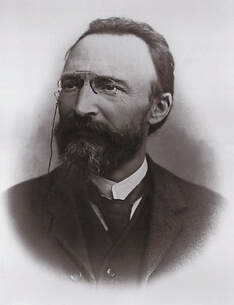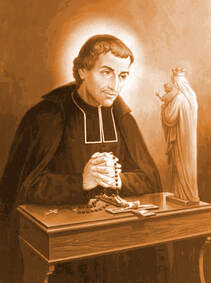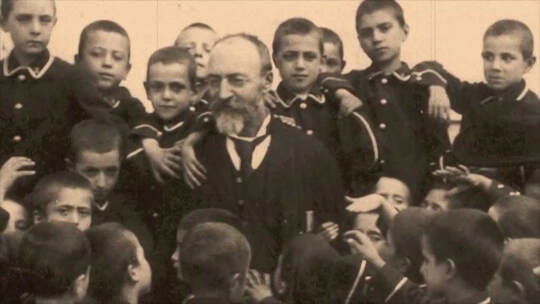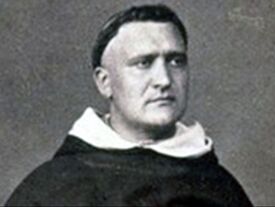 Blessed Bartolo Longo (1841-1926) was beatified by St. John Paul II on 26th October 1980. Pope Benedict XVI, speaking of Bartolo Longo in a homily, likened him to St Paul of Tarsus, who also initially persecuted the Church and described Bartolo as being "militantly anticlerical and engaging in spiritualist and superstitious practices". His story is quite amazing. Born into a devoutly Catholic family in the small town of Latiano in Brindisi, southern Italy, Bartolo grew up in a home where his parents, Bartolomeo and Antonina prayed the rosary together daily. However when Bartolo was just 10 years old, his mother died and he slowly drifted away from the faith. Studying Law at university in Naples he became involved with an occult sect and was “ordained” as a satanic “priest”. He took part in séances, fortune telling and orgies and began to publicly ridicule Christianity encouraging other Catholics to leave the Church. None of these activities brought him any joy and his personal life was marked by extreme depression, paranoia, confusion and anxiety. He ultimately experienced a complete mental breakdown. In the depths of despair, Bartolo heard the voice of his deceased father urging him to “return to God, return to God”. He turned to a friend for help, who convinced him to abandon Satan and seek the help of a Dominican priest, Fr Alberto Radente. Bartolo made a full confession and Fr Radente further helped him to reclaim his life.
One evening, as he walked near-the ruins of a chapel in Pompeii, Bartolo had a profound mystical experience. He wrote: "As I pondered over my condition, I experienced a deep sense of despair and almost committed suicide. Then I heard an echo in my ear of the voice of Friar Alberto repeating the words of the Blessed Virgin Mary: ‘If you seek salvation, promulgate the rosary. This is Mary's own promise’. These words illumined my soul. I went on my knees. 'If it is true. I will not leave this valley until I have propagated your rosary.' Bartolo became a Third Order Dominican, taking the name Brother Rosario in honour of the rosary and joined a charitable group in Pompeii. He worked alongside Countess Mariana di Fusco, a wealthy local widow whom he later married.The couple decided to start a confraternity of the rosary. To serve as a spiritual focus for this group, Bartolo needed a painting of the Blessed Virgin and was offered one by Sister Maria Concetta de Litala of the Monastery of the Rosary at Porta Medina. She had found it in a second hand shop in Naples and had paid a tiny amount of money for it. Though it was not considered of particular aesthetic beauty and was in very poor condition, it served Bartolo's purpose. He described it in his journal: "Not only was it worm-eaten, but the face of the Madonna was that of a coarse, rough country-woman, a piece of canvas was missing just above her head, her mantle was cracked. Nothing need be said of the hideousness of the other figures. St Dominic looked like a street idiot. To Our Lady's left was a St Rose. This I had changed later into a St Catherine of Siena . I hesitated whether to refuse the gift or to accept, I took it."
In addition, Bartolo restored a ruined church in Pompeii in October 1873 and then sponsored a feast in honour of Our Lady of the rosary. He installed the repaired painting in this very church. Within hours of its installation miracles began to be reported and people came to the church in droves. Seeing the devotion of the pilgrims, the Bishop of Nola encouraged Bartolo to construct a larger church. He approached the architect Giovanni Rispoli to build it, making the following appeal: "In this place selected for its prodigies, we wish to leave to present and future generations a monument to the Queen of Victories that will be less unworthy of her greatness but more worthy of our faith and love." Bartolo continued promoting the rosary and spreading devotion to Our Lady until his death in 1926, at the age of 75. He would evangelise young people at parties and in local cafes, explaining the dangers of occultism. He would witness continually as to the glories of Christ, the munificence of His mother and the beauty of the Catholic Faith.
0 Comments
 St Louis Marie was born in Brittany in 1673. He studied in Paris and was ordained to the priesthood in 1700. He died at the age of 43 years in St Laurent sur Sevres, after a life as an itinerant preacher, devoted to the poor and to preaching against the errors of Jansenism, which did not make him popular with some of the bishops of his time. Pope Clement XI conferred on him the title and authority of Missionary Apostolic, confirming him in his mission . As a student, he took great delight in researching the writings of the Church Fathers, Doctors and Saints as they related to the Blessed Virgin Mary, to whom he was singularly devoted. Under her inspiration, he founded the Daughters of Divine Wisdom, who were committed to the care of the destitute and in 1715, a year before his death, founded a missionary band known as the Company or Mary. A member of the Third Order of St Dominic, he was one of the greatest apostles of the Rosary in his day, promoting authentic Marian devotion wherever he went. His greatest contribution to the Church and the world is Total Consecration to the Blessed Virgin. Among his most influential writings were: The Secret of Mary, The Secret of the Rosary, True Devotion to Mary which has influenced countless people since, including Pope John Paul II, Frank Duff, founder of the Legion of Mary and Matt Talbot, to name but a few. The cause for his declaration as a Doctor of the Church is now being pursued. Although St Louis is perhaps best known for his Mariology and devotion to the Blessed Virgin Mary, his spirituality is founded on the mystery of the Incarnation of Jesus Christ, and is centred on Christ. Hail, then, O immaculate Mary,
living tabernacle of the Divinity, where the Eternal Wisdom willed to be hidden and to be adored by angels and by men! Hail, O Queen of Heaven and earth, to whose empire everything is subject which is under God. Hail, O sure refuge of sinners, whose mercy fails no one. Hear the desires which I have of the Divine Wisdom; and for that end receive the vows and offerings which in my lowliness I present to thee. St Louis Marie, from “True Devotion to the Blessed Virgin Mary”
|
Details
Archives |


 RSS Feed
RSS Feed